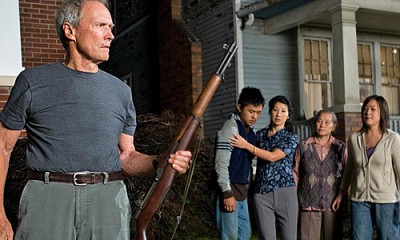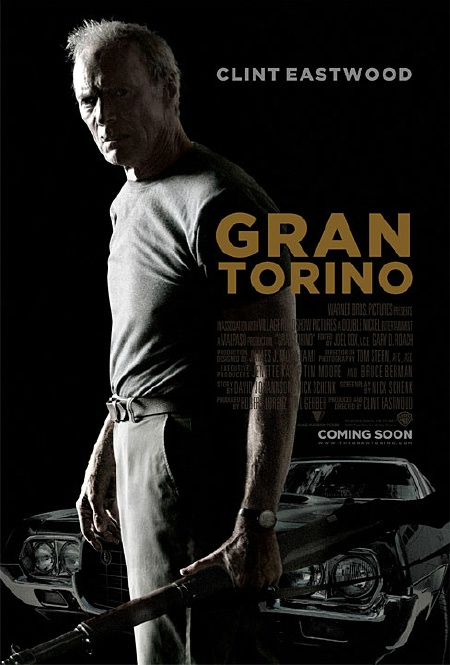written by: Nick Schenk (screenplay/story) & Dave Johannson
produced & directed by: Clint Eastwood
rated R (for language throughout and some violence)
1 hr. 56 min.
If it wasn't for iconic characters like The Man With No Name and Dirty Harry, there would be no way to take Clint Eastwood's latest acting role seriously. One of the more resonating characteristics of these gun-toting, take-no-crap personas is the way in which they resolve their problems with a blast of gunfire and a resoluting wisecrack, while walking away without a second thought. Many of us wish at times that we could get away with that behavior, so does racist Korean War vet, Walt Kowalski. Retired after 50 years from the local Detroit Ford plant and recently widowed, Walt grumbles and growls his days away as he nurses his perfectly-manicured postage stamp of a lawn in his well-maintained, picket-white fenced home.
Walt is that old goat who looks around at his world and wonders how things have gotten the way they are. His selfish and chubby Midwest sons, busy with their careers, have alienated themselves (most likely due to his cold gruffness) as they plot out how to get Walt into a senior home. He groans at his grandkids with their piercings and blackberrys but also at the persistant Father Janovich (Christopher Carley) from his wife's church. Walt doesn't care for the baby-faced padre who promised his wife that he'd get him to confession. It would seem Walt cares only for a handful of things at this stage in his life: his Lab retriever Daisy, his M1 rifle from the war, and his mint condition 1972 Gran Torino, a symbol of days long gone. Walt finds himself as lost and without a place as the company he used to work for.
What gets under Walt's skin the most though is the noticeable influx of Asian Hmong immigrants he finds himself surrounded by in what used to be a blue-collared neighborhood. No country for this old man, indeed! Eastwood plays up Walt's disdain to the hilt but we can't despise him because we realize he's cut from a different time period. While there's no excuse for his abrasive racism, you can't help but respect who he is and that's a tribute to the actor who's playin' this worn-down character. With all this build up, it's obvious that Walt is destined to get a serious thawing.
That comes in the form of the neighbor teen, Tao (Bee Vang) who tries to steal Walt's beloved vehicle in a gang initiation stunt. He thwarts the freshman thief but this encounter just catapults the inevitable. The botched theft is what brings a livid Walt rifle-first into the Hmong neighbors as he winds up breaking up a gang fight on his front lawn. Inadvertantly scaring off the gangbangers, Walt unintentionally winds up saving Tao and his family from further violence. All he wanted was them to stay off his well-kept lawn. What follows is an outpouring of gratitiude from the Hmong family and as punishment for his actions, Tao is made to work for Walt (though it's unclear who this is punishment for) in order to restore honor to the family.
Tao's older, plucky sister, Sue (Ahney Her) starts to wear down Walt's calcified heart as she becomes his introduction to her family which finds him coming to terms with the Hmong culture. Through his encounters with the various generations, he starts to see that he is a haunted man, empty and without peace. A man who hides behind any racial epithet possible without any possibility of anyone really getting to know who he is. Walt is soon won over by Hmong traditions, befriending Thao with hopes to teach him some self-respect before the gang activity worsens. But he sees there isn't much hope or future for Tao and his family and is compelled to intervene, driving away local gang members and earning the respect of the Hmong community.

For Walt, defending the defenseless is a form of atonement and an act of contrition. The killings in Korea still effect him, as he tells Tao, "I used to stash guys like you five fet high in Korea. Used 'em for sandbags," which only confirms that some resolve is needed. He now has a reason to do away with his bitterness and protect these kids against anyone who would do them harm. Yet unlike the typical Eastwood vengeance flick we're used to, this is as much in line with Will Munny (from "Unforgiven") in that there is a price one must pay when violence is used. Esatwood knows it would be plain stupid at his age to have Walt decimate the gangs in the hood. Instead, we're given an emotional resonance that becomes enthematic for the entire film. There's a final validation here for Walt which gives the viewer a rewarding cinematic experience.
Eastwood successfully culminates all the tough-guy characters he's known for into Walt Kowalski, an incorrigible soul who has to deal with issues of life, death, racism and salvation. While it may not be his best performance it certainly is one of his more ballsy ones. Is it a perfect script? No, not really. Are there flaws? Some. It's not a scholastic take on race relations, but newcomer Schnek understands the venomous mentality of men like Walt, who live and breathe outdated American values, only to find their faith rewarded by the degeneration of respect in the youth and the rise of foreign perspectives in their own backyard. I appreciated the fact that Eastwood used primarily first-time Hmong and Asian actors. It lended an added authenticity and naturalness to the characters that at time is jarringly noticeable but a welcome surprise nonetheless.
Like many of his smaller films (Million Dollar Baby) there's an exacted simplicity that is to be commended here. An easy-going yet purposeful filmmaking style that is long gone. At 78 years, Clint has no peer. No one else can do what he does, making him the best there is at what he does. If this is to be Eastwood's swan song as an actor (gasp!) then this is quite appropriate. For anyone who enjoys Clint's acting, his humor, his honesty and craftsmanship as a director....this is a must see.

The Skinny:
- The film will see a limited release in the States on December 12th and 17th and then a wider release on January 9th, 2009.
- Filmmakers chose to produce the film in the state of Michigan, being one of the first films to take advantage of the state's new law that provided lucrative incentive packages to film productions.
- Filming began in July 2008; locations included Warren, Royal Oak, and Grosse Pointe Park, with work on the final cut endint in late October 2008.
- Hmong crew, production assistants, consultants and extras were used.
- There has been debate over the film's depiction of Hmong gang culture, with some criticizing its authenticity and fearing that the film will perpetuate stereotypes of Asian youths.
- Eastwood described the character's relationship with his two prized objects (the Gran Torino and M1 rifle, "He worked on the line in the Ford plant and retired and had this one car he bought himself. It's sort of a symbol of his days with the Ford plant. The M-1 is sort of a symbol of his days in the military... He's clinging to the memory of the war. You'll find out when you see it, some of (the memories) are not as pleasant as others. That helps make him even tougher to get along with."
- Of the character, Eastwood said, "He's one of these guys who finds it very hard to accept change... [and that the film] just shows how his life goes and how he gets involved with the Hmong people who are living next door."
- Eastwood's starring role was his first since Million Dollar Baby in 2004.
- The character of Tao is Van's first acting role and is described as "the neighborhood wimp", and the large height difference between Tao and Kowalski was a deliberate echo of the mentor relationship Kowalski has to the character. Vang said, "Tao is literally 'looking up' to [him]".
- Open casting calls for Hmong actors were held in Hmong communities in Saint Paul, Fresno and Detroit. All but one of the ten Hmong leads were acting in a film for the first time, as were many of the Hmong extras.
- Eastwood's son, Scott (son of flight attendant Kathryn Reeves) plays a spineless thug named Trey in a hilarious scene where Walt defends Sure from some African-American thugs.
- For authenticity, Eastwood encouraged ad-libbing among the actors in the Hmong language. An authentic Hmong shaman was cast, though it was claimed his ceremonial scenes were made more exotic.
- Eastwood has win Best Actor recently at the National Board of Review Awards.
- Eastwood often composes music for his films and this one is no different. This time he actually sings a little of the theme song, Gran Torino, that can be heard in the final scenes.
- He wrote the song, which is nominated for a Golden Globe, with his son, Kyle, Michael Stevens and singer, Jamie Cullum (who can be heard singing in at the end credits).
Eastwood talks cars and Gran Torino


No comments:
Post a Comment